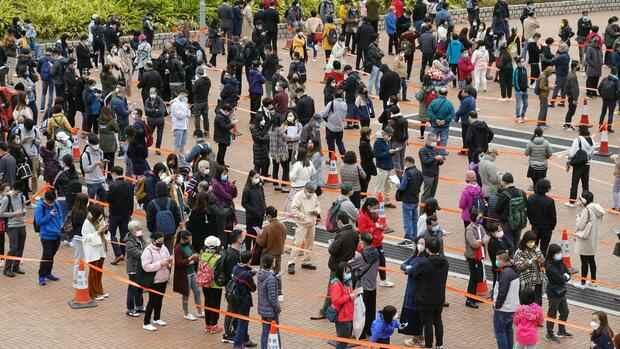qingdao In Hong Kong, the corona pandemic threatens to get out of control. The 7.5 million metropolis has had more than 7,600 new infections in the past 14 days. More than 1000 cases are currently being added every day.
Doctors warn that the number could rise to 28,000 infections per day by the end of March. But the city’s health facilities are already “overwhelmed,” said Prime Minister Carrie Lam.
The city administration has therefore asked the central government in Beijing for help. There is growing concern among observers that China could use the omicron eruption to expand its grip on the SAR.
China has tightened its control over the once relatively liberal special administrative region in the wake of the pro-democracy protests in early 2019. In July last year, a strict so-called National Security Law came into force, which abolished many previous freedoms. As a result, numerous opposition politicians and journalists were arrested.
Now there is growing concern that the government in Beijing could use the current corona outbreak to further expand its influence. So far, the talk has primarily been of medical support.
The central government wants to send “thousands of medical and laboratory workers and millions of test kits” to help Hong Kong, according to the Hong Kong newspaper South China Morning Post, citing an insider in Beijing.
Beware of stricter measures
But concerns about stricter measures remain. Criticism of the Hong Kong city administration’s crisis management in the Chinese media should contribute to this: It is said to be too “western-oriented” and has contributed to the “line of defense being breached”.
>> Read about this: “Censorship, harassment, persecution” – Hong Kong is becoming increasingly unattractive for companies
Unlike mainland China, which follows a strict zero-Covid policy and seals off entire blocks of flats even in the event of a single infection, Hong Kong relies on the principle of “dynamic zero”. Hong Kong also has strict quarantine rules upon entry. But the city has so far refrained from major lockdowns.
Criticism from the business world of the financial metropolis, especially of the strict entry rules, had recently become louder and louder. Prime Minister Lam had even promised an easing.
Danny Lau, honorary chairman of the Hong Kong Small and Medium Enterprises Association, told Bloomberg news agency: “I think most government officials know that it is impossible to maintain Covid Zero, but there is nothing they can do about it because they have to follow China’s policies. ”
Hong Kong is becoming “more and more of a ghost town”. Experts also see the danger that this could accelerate the brain drain, i.e. the brain drain that Hong Kong has suffered since the National Security Law came into force.
The head of the luxury hotel group Mandarin Oriental has urged his management team to be based outside of Hong Kong, at least temporarily, as the isolated city has become a “very bad” location due to the strict coronavirus restrictions, the Financial Times quotes him as saying.
Rating agencies lower outlook for Hong Kong’s economy
Analysts at the rating agency Fitch lowered their forecasts for Hong Kong’s economy for 2022 last week, saying that the city is among the weakest of the 120 economies rated by Fitch due to the delayed recovery from the pandemic.
Hong Kongers are lining up at a temporary testing center to be tested for the coronavirus.
(Photo: dpa)
But the pandemic rules are unlikely to be relaxed in the foreseeable future. Because a flattening of the current wave is currently not foreseeable. Health chief Edwin Tsui told local media: “We believe the infection numbers will remain high.”
A study by Hong Kong City University even anticipates that the current outbreak could infect up to 250,000 Hong Kongers by the end of the month. The health authorities are already no longer able to trace chains of infection. Unlike the mainland, Hong Kong does not have a system to monitor residents’ whereabouts for privacy reasons.
The starting point of the current wave is a violation of the quarantine rules by two flight attendants in December. They are said to have introduced the highly contagious omicron variant of the coronavirus.
Previously, Hong Kong had always managed to contain minor outbreaks quickly. This is probably one of the reasons why the vaccination rate in the metropolis is low, especially among older people, who are considered to be particularly at risk.
Only a little more than 50 percent of the 70 to 79 year olds are fully vaccinated, and even only 25 percent of the over 80 year olds. In Hong Kong, unlike the mainland, Biontech’s mRNA vaccine is available in addition to the Chinese Sinovac vaccine.
More: Omikron has now arrived in China – and is challenging the zero-Covid strategy
